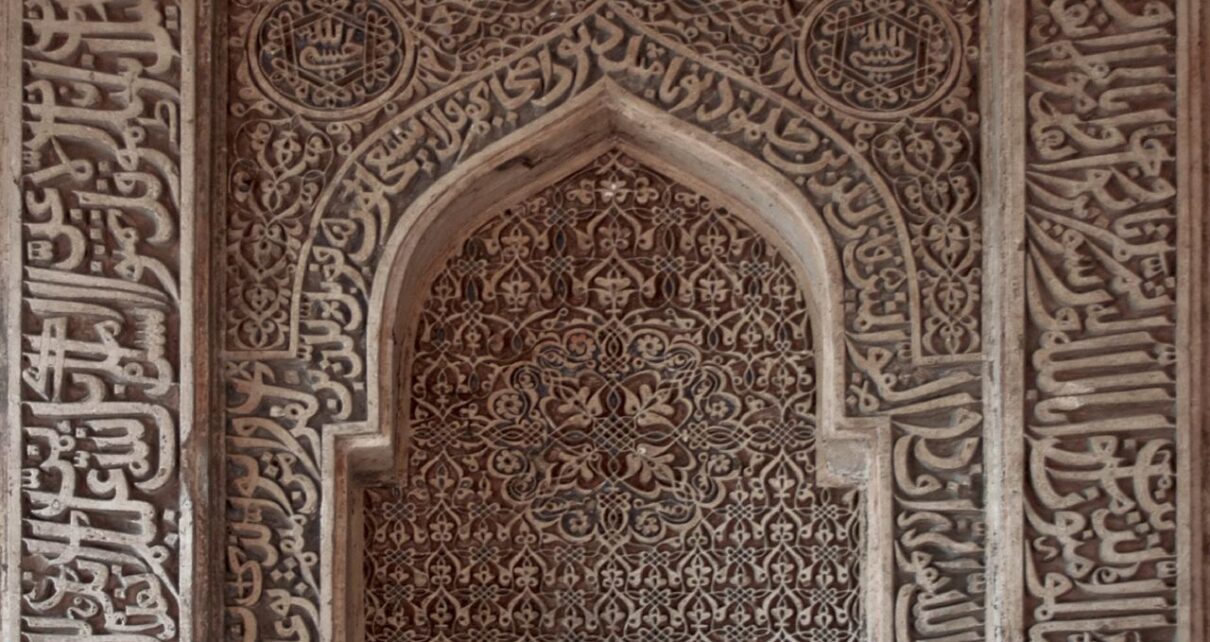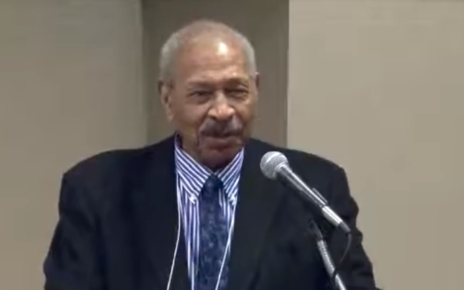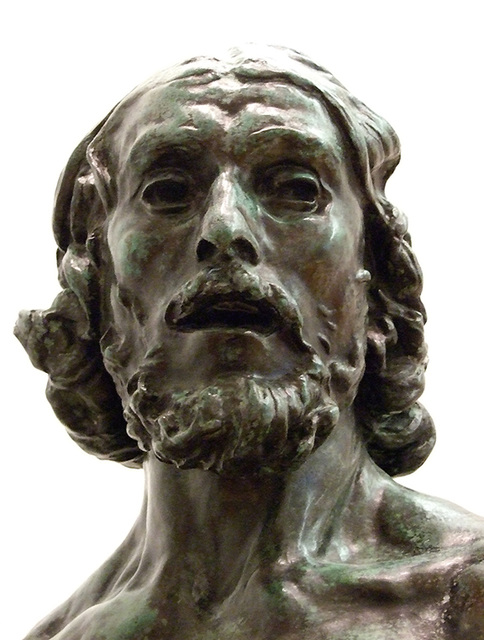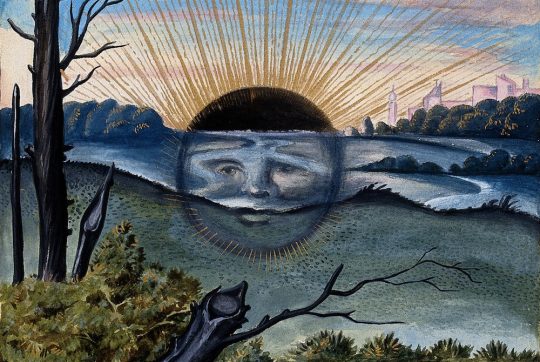The following is the first of a two-part series. The full article is published in the spring 2022 issue of the Journal for Cultural and Religious Theory.
“America never EVER happened… we just believe in the idea that America has happened”
—Charles H. Long 1994, Syracuse University
“Afridi, you want to control the world! You are an AFRIDI, a mountain warrior…you are a warrior woman!” Dr. Long would exclaim as I sat at dinner with him at Pascale’s in downtown Syracuse or at times at the darkly lit Sheraton Bar at the bottom of the Syracuse University campus. I listened to his very complex and intricate understanding of the world, asking myself: What did he mean? I wanted to control the world? How could I as a young Muslim woman struggling to keep everything together want to control the world? Several years later, I asked Dr. Long what he meant and he smiled and just repeated: “Afridi, Afridi, Afridi…you don’t understand anything about your peoples!” My tribe, the Afridis, are one of the fiercest and oldest families from the North West Frontier of Afghanistan and Pakistan. This is what he meant. He was pushing me to take a deep look into my own roots, heritage, and in this case, my historical implication as an Afridi.
In the many years I spent listening to Dr. Long and trying to decipher his intricate language, whether in his well-known book Significations: Signs, Symbols, and Images in the Interpretation of Religion, or in class, lectures, and cocktail parties, I finally learned one thing about Dr. Long very early on: that he was never talking about anything directly, but everything he said was about what you should or might be thinking about. Another lesson was that if you could get it, good, and if not, you were not fit for the challenge of critical thinking. I remember Dr. Long fondly and was fortunate to host him at Manhattan College for a lecture a few years before he passed on. Most importantly, I was able to learn from a mentor that changed the way I approach my own work on Islam and the Holocaust.
When I was still an undergraduate, I was permitted to take a few graduate classes in the Department of Religious Studies at Syracuse University. One of my first classes as a 19-year-old was with Dr. Charles H. Long in a class entitled “Early Islam.” I was excited to begin a new adventure with one of the most celebrated historians of religion and study with an African American scholar. I was about to learn about the historical and social underpinnings of my own background as a Muslim. I recall that we read Ferdinand Braudel, Marshall Hodgson, Mohammed Baymeh, and Richard Bulliet. As a Muslim woman, Dr. Long inspired within me a different conceptualization of Islam and more importantly, how to see my own ontological bearing in reading my own history. I was to discover my own orientation of religion.
The Lens that native religionists tend to ignore in the midst of our timeless absorption of being religious or identifying ourselves with a specific religion. Long argued that we had already defined the self and institutionalized our identities in such a way that “the effort to understand the self through the mediation of the other” was a way to understand the opacity of how one understood one’s identity, history, and especially religion.[1]
There are two deeply important aspects that Dr. Long’s teaching and writing taught me that have influenced me up until today; one was how to address our own religious complexity and two that religion had been institutionalized by Christianity primarily in every point of American history as a locus. He asked us to problematize this locus, which was a colonial one, and how the “discovery” of the “new” world was reifying old symbolic orders rather than creating new ones. This thinking and more led me to think about my own place or space within Islamic history. In the United States, I was no longer an outsider but on the brink of being inside/outside of American history, as Long taught me one’s consciousness was never one but multiple in the sense of W.E.B Du Bois’s double-consciousness. My perspective changed about how to read the history of Islam with Dr. Charles H. Long; he transformed within me the idea of insider and outsider and offered me the gift of a complex identity or a manner of how to be a Muslim-American without trying to fit into the locus of the colonized, but rather to orient oneself in one’s own reality – to create within me an orientation that was not always dictated by my identity as a Muslim and a woman. In other words, I was to be, just be, and not become something that I was not.
The exploration of the non-Western world was what led the history of religions to develop, and this is where Long developed a hermeneutical project that developed the lens of the colonizer and colonized: seeking the nuances and gaps between what was the case and what was seen or perceived,as was the case in Ludwig Wittgenstein’s approach. Long’s approach in his work, but primarily in his teaching, which is what I valued the most, was his oral narration and exemplary manner of showing that objects of study were and are undermined by how we study them. In other words, institutional structures like Christianity in the New World and “Western” traditions were imbued with an internal colonial narrative that was hard to shake.
Recently, Americans have witnessed a rise in religious violence globally. We have also seen open religious racism in the United States. The Muslim ban ordered by President Donald Trump in 2017 and resurgent antisemitism testify to that as we continue to divide American life, distorting the truth and disrespecting religious freedom. “America First” nationalism is especially unwelcoming to Muslims, the strangers outside our borders but also within them. For Long, these sentiments would have signaled the beginning of a “necessary lie” that framed Europeans as superior in relation to the “other” (primitive) Muslim.[2] Similarly, Orientalism was termed by Edward Said as a distortion or misrepresentation of people of Asia or the Middle East through a colonial lens.
Take one meaning of Orientalism as a linguistic index: Arabia is a possible world, but it takes on reality as soon as Arabic is spoken or Arabia is spoken about within a given field of experience, say, perfume or belly dance or terrorism. Said tells us, from the situation in which Arabia is realized by becoming the field of experience of domination and/or misrepresentation itself. Here, then, is a concept of the Other that is distorted and deliberately deformed by the West so that it may appear inferior. It is in this sense that Said thought anew the discipline of Orientalism.[3]
The outside/inside concept within Muslim-Americans has not only seeped into those inside American borders; the Muslim ban has polarized and divided life in the United States, deepened by religious divisions, distorted truth, and disregard for religious freedom. Muslims have felt rejected in how they have been treated differently in terms of politics and economics, refugees and immigration, race and religion, ethnicity, and gender. American nationalism has been seen as unwelcoming to the Muslim, the strangers outside our borders but also within them.
Muslim–Americans and Islam have had a complicated relationship with the United States where Muslim-Americans have been perceived as “other” and yet simultaneously been offered rare religious freedom as their first constitutional amendment. Religious freedom to all in visual and spiritual expression, this amendment is unlike any other country in the world, including Muslim countries.[4] However, the recent pattern of this fracturing has been challenging and painful. Long would see this as a problem. He would say: “When you are an oppressed people, your group is never looked upon as possessing diversity or variety; it is always looked upon as possessing a much more homogeneous character.”[5] As one Muslim-American wrote:
I went on the local NPR station and someone called into the show with a comment about our #AskAMuslim project. She said she was an elderly black woman and went on to describe how she’s only ever seen the kind of discrimination that Muslims are facing right now in the discrimination and racism that black people experienced and continue to experience in America. She rocked me and all I could do was tear up for all the injustice in the world. I could only express to her that #BlackLivesMatter and #antiIslamophobia work are combating the very same problematic ideology. Not only because one-third of American Muslims are black, but even more so because ultimately all of these symptoms rise from the disease that is fear of the unknown which leads to fighting that which we do not know.[6]
Dr. Long would lecture late into the night. At times, he was intimidating to some, but if you could withstand the intensity, you were being educated and deconstructed of the many social constructions that you may have grown up with. He was truly challenging the lens with which we were used to in the U.S. and especially from a white European perspective. He, although himself a successful academic, reminded me of my own status quo of being privileged even if I was different. He reminded me, “You are still caught within the frames of the ivory tower of academia.”
Dr. Long had launched my thinking into a heuristic balance that invited me to live in the cognizance of being “other,” both historically and philosophically. Let me explain. For me, I was dealing with the “Fear of the unknown” in both my life as a Muslim woman pursuing a degree in Religious Studies and simultaneously my own identity as a Muslim. My ontology was Muslim but also something else which has been expressed on many levels in America, especially through a historical political lens that has recently taken on more of a religious meaning and political identity of Islam. For example, Muslims were historically depicted as oriental, exotic, and dangerous through paintings, postcards, and later in film.[7]
I wrote my doctoral thesis on Islam but specifically on Naguib Mahfouz, the Egyptian Nobel Laureate in 1988. Naguib Mahfouz’s literature taught me so much about his own cognizance of how Arabs and Egyptians had been described by literature and politics of the binaries of east and west. However, it was through the lens of European literature of the 20th century that I truly analyzed how the western view has shaped the narrative of the nameless and faceless Arabs and Muslims. For example, literature in the 1940s was, per se, the parallel of present-day social media. For example, the novel The Stranger by Albert Camus was set at a time when World War II was in place. It was to show how absurd the world was. It became a poignant example of the stranger in the colonial context in the 1943 novel, The Stranger by Albert Camus. This novel ruminates on Long’s explicit description of what he meant by the primitive/civilized. Camus, however, takes a nihilist approach to life, whether or not it is a masking of how he perceives the “other.” His descriptions of existence and the protagonist (Meursault) who compels the reader to look for the “stranger” and the “other” in Algiers through the precise censorship of the stranger (the Arab) makes a glaring commentary on the reverberations of the colonial or as Long would put it, the locus of control. Algeria, a distant place from America and France, perhaps, but a reminder that Europeans were already constructing the “other” in a country far away. France as the colonial power in Algiers forces us to contemplate the nameless Arab (Muslim) as witnessed in America today: “Citizens in the West are more likely to associate Muslims with terrorism if they feel threatened by their physical and cultural existence.”[8]
Mehnaz Afridi is a professor of religious studies at Manhattan College and director of the Holocaust, Genocide and Interfaith Education Center. Dr. Afridi earned her Ph.D. in religious studies from the University of South Africa. Her research focuses primarily on Islam and contemporary literature, the intersection of Judaism and Islam, the Holocaust and the role of Muslims, antisemitism and Islamophobia. Her recent book Shoah through Muslim Eyes (Academic Studies Press, 2017) was nominated for the Yad Vashem International Book Prize for Holocaust Research and the Jacob Schnitzer Book Award.
__________________________________________________________________________
[1] Charles H. Long, Significations: Signs, Symbols, and Images in the Interpretation of Religion (New York: Fortress Press, 1986), 107.
[2] Long, Significations: Signs, Symbols, and Images in the Interpretation of Religion, 97.
[3] Marrouchi Mustapha, Edward Said at The Limits (New York: State University of New York Press, 2004), 82.
[4] Examples of many countries that do not allow freedom of religion include communist, secular, and religious ones around the world such as France, Germany, Pakistan, Iran, and China.
[5] Manhattan College, 2014.
[6] Mona Haydar, qtd. In Imran Kahn, “5 Quotes on the Ugliness of Islamophobia,” The Bearded One (blog), April 30, 2016, https://blogofthebeardedone.wordpress.com/2016/04/30/5-quotes-on-the-ugliness-of-islamophobia/.
[7] Edward Said, Orientalism (New York: Vintage, 1978). Edward Said was the first to coin this term “Orientalism” and describe how Muslims were depicted in Arab/Muslim places.
[8] Sabri Ciftci, “Islamophobia and Threat Perceptions: Explaining Anti-Muslim Sentiment in the West” Journal of Muslim Minority Affairs 32, no. 3 (2012): 293-309. DOI: 10.1080/13602004.2012.727291




